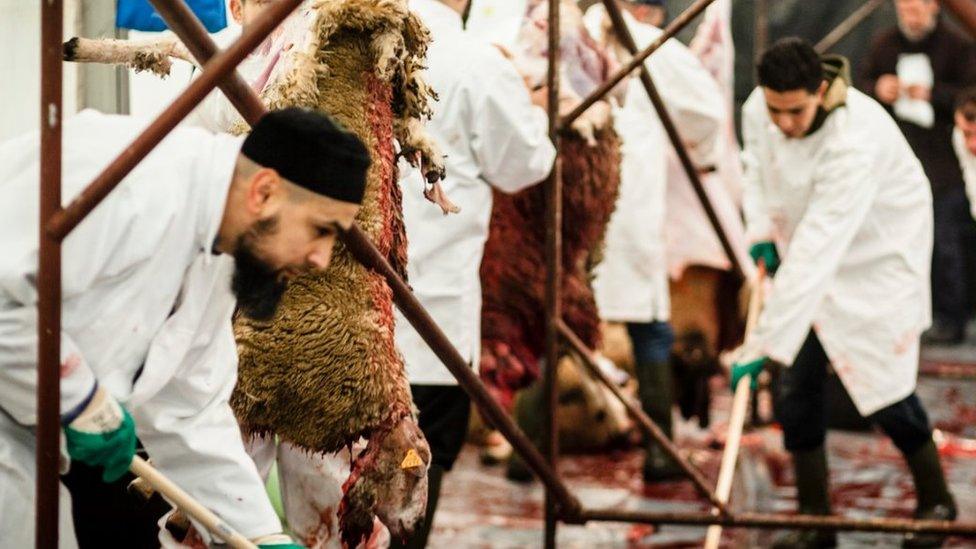EU Court backs ban on animal slaughter without stunning
- Published

File pic: Muslim and Jewish groups challenged the Belgian ban, which came into force last year
A Belgian ban on kosher and halal slaughter of animals without being stunned has been backed by the European Court of Justice, which rejected objections by religious groups.
The EU's highest court backed a Flemish decision to require the use of stunning for livestock on animal rights grounds.
The animal is not killed in the stunning process.
The head of the conference of European rabbis said the ruling would be felt by Jewish communities across Europe.
"This decision goes even further than expected and flies in the face of recent statements from the European institutions that Jewish life is to be treasured and respected," said Chief Rabbi Pinchas Goldschmidt.
But the Flanders government in northern Belgium hailed Thursday's decision, with nationalist animal welfare minister Ben Weyts saying "we're today writing history". Animal rights group Gaia said it was a great day and the culmination of a 25-year struggle.
The ruling came as a surprise as it went contrary to a recommendation in September to quash the Flemish law by the Court's Advocate General, who said stricter animal welfare rules were allowed if the "core" religious practice was not encroached upon.

Flemish minister Ben Weyts said he would now reach out to religious communities to "turn the page"
Under the requirements of Muslim halal slaughter or Jewish shechita, an animal's throat is slit quickly with a surgically sharp knife while it is still conscious.
EU law, along with UK law, external, already requires animals to be stunned before being killed, unless the meat is intended for Muslims or Jews, and then only in approved abbatoirs.
What did the Court rule?
The European Court said all member states had to reconcile both animal welfare and freedom of religion, external and EU law did not prevent countries from requiring the stunning of animals as long as they respected fundamental rights.
While the Court accepted that imposing such a requirement limited the rights of Muslims and Jews, it did not ban ritual slaughter and the Belgian law's "interference with the freedom to manifest religion" met an "objective of general interest recognised by the European Union, namely the promotion of animal welfare".
It also said the Flemish parliament had relied on scientific evidence indicating that prior stunning was the best way of reducing an animal's suffering and that the law allowed "a fair balance to be struck" between animal welfare and freedom of religion.
Butcher Mohammed Adnan explains the difference between halal and non-halal meat
Muslim groups repeatedly challenged the Flemish legislation before it was passed and came into force in January 2019. The French-speaking Wallonia area of southern Belgium adopted the law months later.
When the Belgian laws came in, Muslim and Jewish groups feared they were being used by nationalists to whip up anti-immigrant sentiment.
The head of the European Jewish Association, Rabbi Menachem Margolin, said Friday was a "sad day for European Jewry" and Belgium's Jewish umbrella group, CCOJB, said it would take its legal fight to the European Court of Human Rights.
- Published16 February 2015